There was a time back in the 90’s when MTV used to show actual music videos all day long instead of reality shows and whatever they show these days, I don’t really know as I stopped watching MTV in the early 2,000’s. Most of music videos from the so-called “golden era” were shot on film and had grandiose budgets very often exceeding $1 million. As the music video medium as an art form exploded into the scene in the late eighties and further matured in the early to mid-90’s, and quickly became a breeding ground for directing and cinematography talent.
David Fincher, Anton Corbjin, Jonathan Glazer, Michel Gondry, and Spike Jonze, just to name a few, created some absolutely stunning music videos for major music acts such as The Rolling Stones, Aerosmith, Madonna, Depeche Mode, George Michael etc., boasting out-of-this world visuals and bold cinematography. Hollywood quickly recruited them and they evolved into some of the most sought after feature film directors at the moment.
A total legend in the world of music videos, Mark Romanek made came out of the 90’s school of music video making with some of the most striking and iconic music videos of all time. Examples include Nine Inch Nails’ epic “Closer”, (which had the late great Harry Savides behind the camera – another frequent Fincher collaborator, who shot “The Game” for David Fincher in 1997) as well as the most expensive music video of all time – Micheal Jackson’s “Scream” budgeted at $7 Million back in 1995.
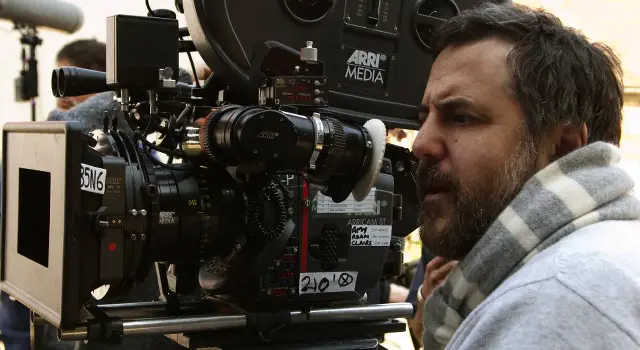
Today the reality is much different, as for the last ten years the market has tanked and music videos are done on the cheap, most with virtually no budgets. It is a shame, and as I have personally done over a dozen low-budget music videos, it is nice to see a behind the scenes look into the making of a big budget music video for a change.
Recently, Mark Romanek directed Taylor Swift’s “Shake it Off” on which he worked with one of Hollywood’s leading DP’s – Jeff Cronenweth, ASC, who has lensed Fincher classics such as “Fight Club”, “The Social Network”, “The Girl With The Dragon Tattoo”, and most recently “Gone Girl”. Jeff was also the cinematographer on Mark Romanek 2002 psychological thriller – “One Hour Photo” starring the late Robin Williams.
Matt Workman, a commercials DP and previz artist based in NYC did an excellent write up on the cinematography of the music video at The Cinematography Database, parts of which I’ve summarised below.
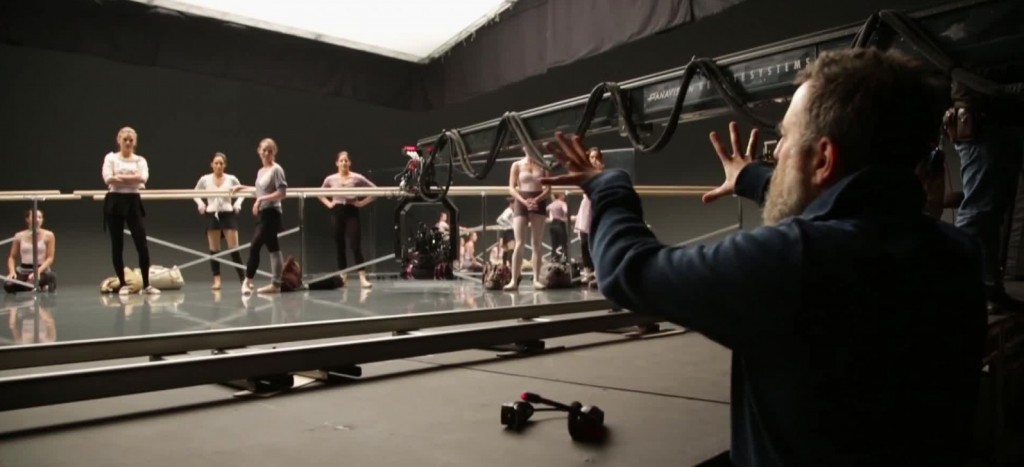
Mark Romanek sets up a shot with a Techno crane
CAMERAS & GRIP
Mark Romanek’s music videos share a common visual style expressed through bold stylistic choices embellished with an almost surgical precision. For “Shake it Off” he and Jeff went with three 6K RED Dragon’s and Leica Summilux primes and Angenieux Optimo 12x zooms, pretty much the same package as Jeff used on Fincher’s “Gone Girl”, in order to create the lavish and stylish classic studio setup look from the 90’s.
The A-Cam RED Dragon was placed on a 30′ SuperTechno Crane with a stabilized Scorpio head. The Technocrane was used to place the camera in hard to reach places and allowed for some smooth tracking shots. The other two Dragon’s were on Fisher 10 dollies with O’Connor fluid heads on the same dolly track, according to Matt.
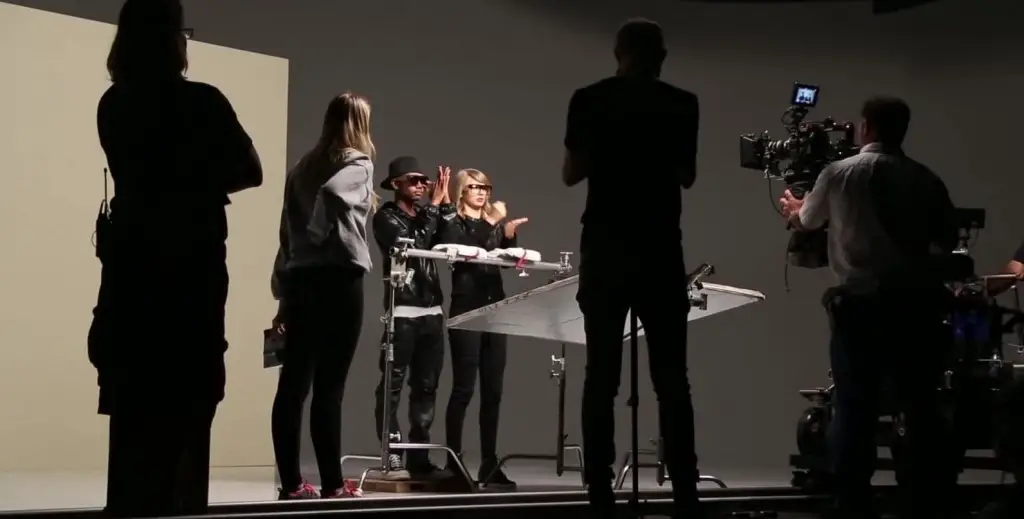
LIGHTING & SET
The video was shot in a large studio with a massive 3 wall cyclorama, often referred to as “cyc”. The classic and slick approach was accentuated with symmetrical framing and soft glamour lighting achieved by a very large 40 x 20 feet soft box providing ample amounts of ambient soft lighting by most likely DMX-controlled KinoFlo Image80’s or 6K Spacelites.
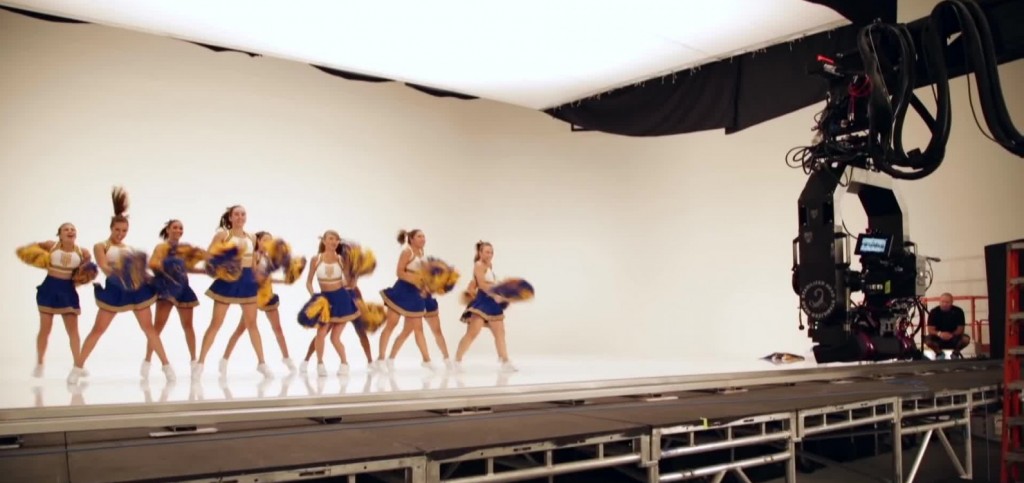
A Briese 180 parabolic umbrella light (with and without diffusion) is used for close-ups as in the shot below. This is a standard kit for fashion and music videos for it’s pleasing soft light, which is a bit harder when used without a diffuser they are softer than bare fresnels or PAR lights.
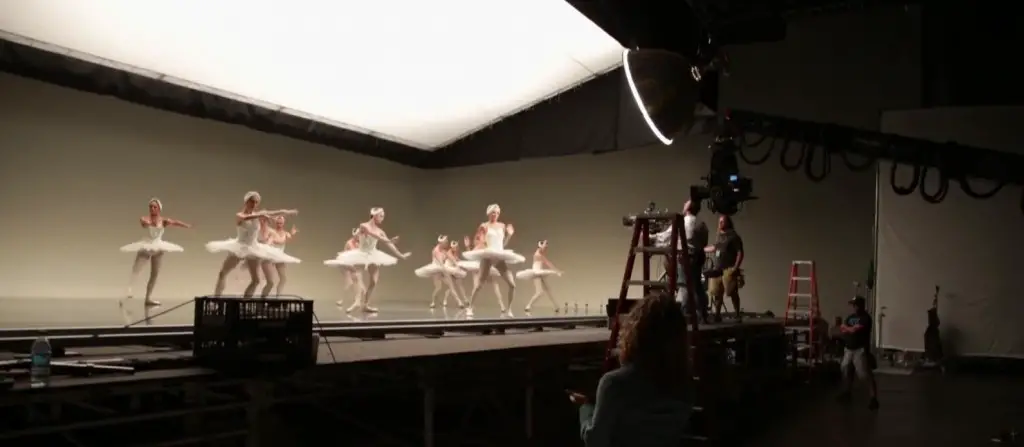
The “shadowless” floor and glossy reflection is achieved via a dark/white plexiglass floor used for creating a glossy look. The floor is built separately on a 4′ steel deck riser, as to allow the cyc walls to be lit separately. This allows for light to be added from the bottom of the cyc, the top, or a combination of both.The floor thus becomes a reflection of the background, just slightly lower in brightness. See pics below for examples from these setups used in the video:
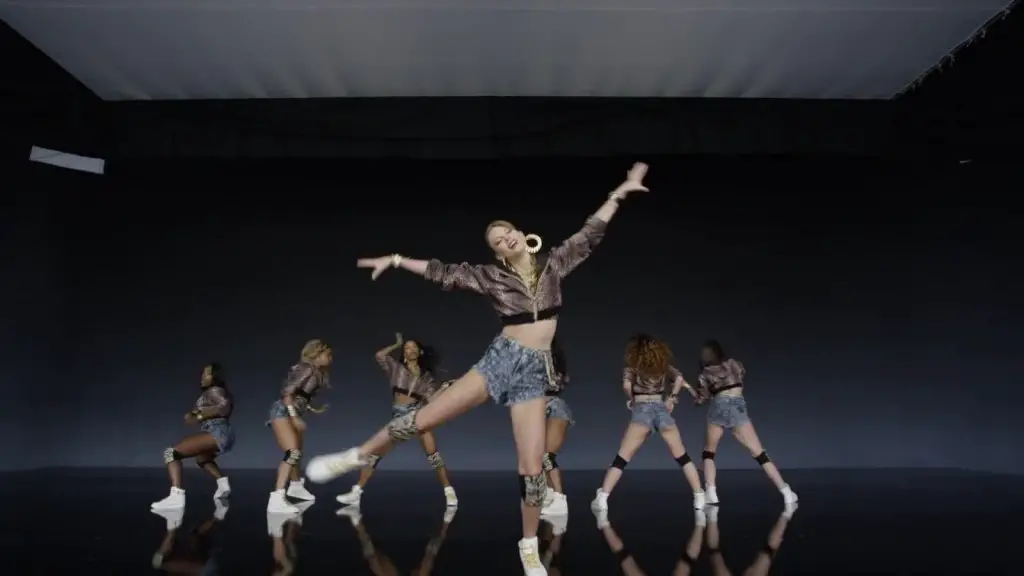
Dark plexi floor
Check out the full video for “Shake it Off” below:
Read Matt Workman’s full writeup at cinematographydb.com
Disclaimer: As an Amazon Associate partner and participant in B&H and Adorama Affiliate programmes, we earn a small comission from each purchase made through the affiliate links listed above at no additional cost to you.



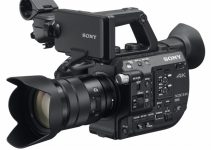
For this kind of equipment the video look like very simple. Almost no movement from the technocrane.
At that level it’s easier for them to keep the A-cam on the Techno almost all the time. Romanek is very demandind and precise, and as Fincher is in love with controlled movement even when there is very little or its subtle.
I think they also used the Techno crane because it places the camera overhead and for lateral movement it’s more practical. It’s very common to see some sort of a techno crane on big budget videos, even if they can technically get away without it. At least that’s how I see it, but hey when you are shooting a $1M+ music video, the Techno crane sort of comes with the package 🙂
Also worth noting that the performers are standing on a raised floor so it’s not easy to get a dolly on there. Also the less gear directly on the plexiglass the better.
Andrey, how’s your new GH4 coming along? Loving it so far I hope